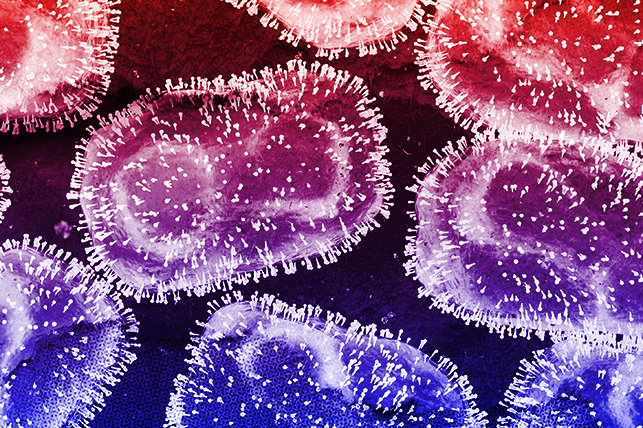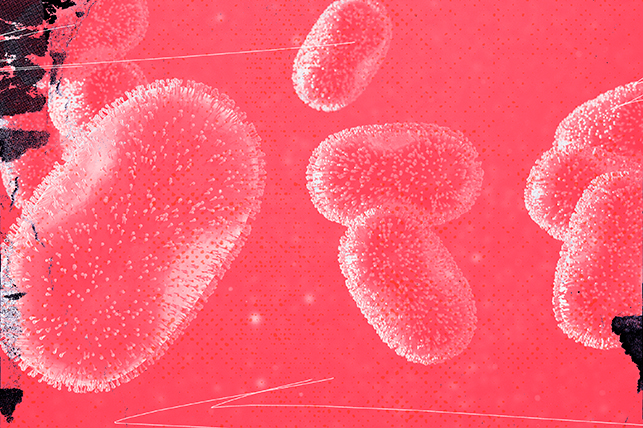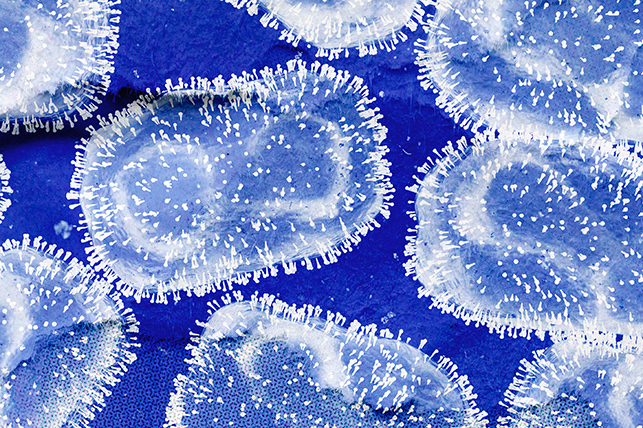What Is Monkeypox? A Look at the Virus and Your Sexual Health

Here's a scenario: There's a new disease, extremely rare but very infectious, and it might be coming your way. If that sounds familiar, it's because this order of operations is pretty much how we first heard about COVID-19. This time, however, monkeypox is not new to American shores.
While its name gives late-night TV hosts something to make everyone laugh, monkeypox is no laughing matter. Rather, it's a painful and uncomfortable virus spread through numerous forms of contact, including sex.
According to the Centers for Disease Control and Prevention (CDC), as of Aug. 22, 2022, there have been 18,417 confirmed cases of monkeypox in the United States, which isn't much in comparison to COVID-19, but we're still in the early phase of the outbreak.
This virus is characterized by various stages of a rash that may resemble pimples or blisters that can eventually scab over. The rash is typically accompanied by flu-like symptoms: general feelings of malaise, fever, chills, muscle aches, headaches, swollen lymph nodes and respiratory symptoms.
How monkeypox spreads
Although most of us have become aware of monkeypox only in the past few months, the virus has been in the United States for many years, though much less prevalent, according to Michelle Forcier, M.D., M.P.H., a clinician at FOLX Health, a U.S. telehealth company. As a viral disease, monkeypox spreads via skin-to-skin contact.
"Spread among humans comes from close skin-to-skin personal contact, such as persons living closely together in the same household, sharing a bedroom, cuddling or having sex," Forcier explained. "It seems like it is also spread through sexual contact, not just the body's skin, but the mucous membranes of the mouth, anus or vagina."
According to the CDC, the virus spreads from direct contact with the monkeypox rash, scabs, respiratory secretions or bodily fluids from someone with monkeypox, and also through intimate contact during oral, anal and vaginal sex. It can also spread through touching the genitals or anus of someone with monkeypox.
Monkeypox spreads via skin-to-skin contact
In this way, all forms of sex, hugging, kissing and massage are conduits to spread monkeypox. Additionally, infection is spread by touching fabrics and objects (such as bedding, towels and sex toys) during sex that were used by someone infected with monkeypox.
Therefore, now more than ever, it's imperative to implement safer sex practices such as using barriers, communicating with partners and keeping an eye out for symptoms in both yourself and your partner.
How monkeypox affects sexual health and wellness
Monkeypox is not fatal for most people, Forcier said. However, that does not mean it's not serious.
"Monkeypox can be scary, causing some very disturbing temporary or scarring skin rashes [that can be] painful or uncomfortable," she explained, noting that atypical presentations of monkeypox may begin with rashes in the genital area rather than on the face or hands. "If monkeypox infects the genital areas, persons might have anorectal pain, rectal bleeding or tenesmus, the feeling like you have to pass a bowel movement even if there is no stool to pass."
In addition to these sexual, bowel, skin and urogenital symptoms, people may have general symptoms like fever, fatigue and headaches.
"While infected with monkeypox, persons may not feel very well or want to have sex," Forcier noted. "And, yes, persons infected with monkeypox should not be having sex while infected, as it helps spread the virus."
Once someone recovers from monkeypox, they can go back to having sex, she said. However, if you know you were exposed to monkeypox, have the infection or are still recovering with rashes and symptoms, you should hold off on having sex and isolate yourself. If you need to be near others or need to break isolation to see your medical provider, cover all lesions and wear a mask.
Precautions you should take
Forcier explained that the current guidelines are to avoid close contact with anyone infected with monkeypox.
"People who have symptoms ideally should not be sexually active while symptomatic," Forcier said, recommending everyone should check in with their partner to see if they have had any symptoms before resuming close personal contact.
Fortunately, some people are eligible for a vaccination to prevent monkeypox or reduce its symptoms, such as people with multiple sexual partners who live in a community or jurisdiction with known monkeypox infections and people who know they had recent sex with an infected partner.
Unfortunately, jumping back into bed with your loved one after monkeypox doesn't have the quick turnaround you might hope for. The virus typically lasts two to four weeks, and requires quite a bit of time before it's safe to be intimate again.
Now more than ever, implement safer sex practices such as using barriers, communicating with partners and keeping an eye out for symptoms in both yourself and your partner.
"All persons, regardless of the degree of exposure to monkeypox, should monitor for symptoms for 21 days after their last exposure," Forcier recommended. "A person is considered still infectious from when they start to have any symptoms until all the skin lesions and rashes have thoroughly scabbed over and all the scabs have fallen off with a fresh layer of intact skin formed."
It's important to note the World Health Organization (WHO) makes the recommendation to use condoms consistently during any sexual activity for 12 weeks after recovering from monkeypox.
"The monkeypox virus has been found in semen and vaginal fluids, but the role of sex or intercourse in the spread of the virus is not currently known," Forcier added.
Check in with your sexual partners
For your sexual health, it's vital to check in with sexual partners about exposure or symptoms. If there has been an exposure or symptoms, hold off on sex until the exposure risk has fully cleared, which not only protects you from infection but also helps stem the wider spread of monkeypox.
Forcier said checking in is especially important if you are in a social group that is seeing increased monkeypox infection and activity.
"In general, it just makes sense to ask your sexual partners if they have been exposed to monkeypox or any recent infections. The same goes for asking about other infectious symptoms, be it monkeypox, COVID-19 or the common cold," she advised. "If [they] say yes to exposure or infection, it might be wise to wait a while until the risk of infection is over before returning to having sex with that person.
"Ideally, we want ourselves and our partners to all be safe and healthy," she added.
More information about the monkeypox outbreak in the United States can be found on the National Monkeypox Vaccine Strategy fact sheet released in June 2022 by the White House.


















